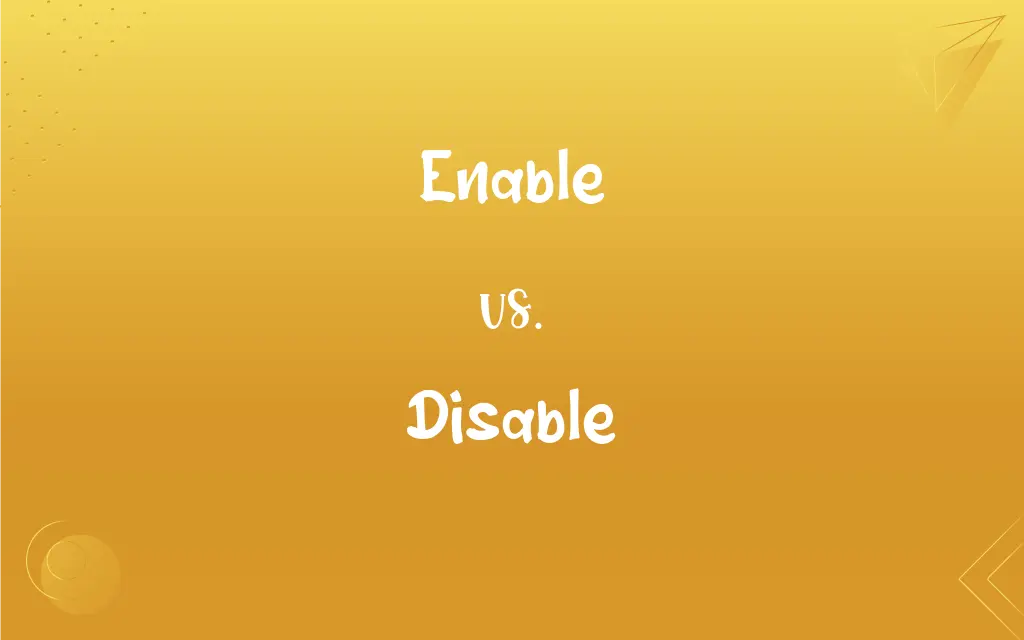Enable vs. Disable: What's the Difference?
Edited by Harlon Moss || By Janet White || Published on October 13, 2023
To enable is to give ability, power, or means to; activate, while to disable is to deprive of ability, or render unable or inoperative.

Key Differences
Enable and Disable are antonyms in the context of allowing or blocking the functioning of something. When you enable something, you are turning it on, allowing it to function, or giving it the capabilities or permissions it needs. In contrast, to disable something means to turn it off, block it, or deprive it of the capabilities or permissions it needs to function, rendering it inoperative.
In technology and software, enabling refers to activating features, functions, or allowing access to specific services or applications. Disabling, oppositely, would be deactivating those features or functions or restricting access to those services or applications, thus preventing them from being used or executed.
In the context of abilities, to enable can mean to empower or to make possible, facilitating individuals to perform certain actions or activities. In contrast, to disable in this context would mean to hinder or to obstruct, making it difficult or impossible for individuals to perform certain actions or activities.
Regarding permissions and accessibility, enabling often refers to granting access or permissions to perform certain actions, allowing individuals or systems the authority to execute specific tasks. On the other hand, disabling in this context would refer to the revocation of such access or permissions, prohibiting the execution of the specific tasks.
The essential difference is that while enabling is about turning on, allowing, or empowering, disabling is about turning off, restricting, or hindering. Both words are crucial in various fields, reflecting whether a function, feature, access, or capability is available or unavailable, permitted, or prohibited.
ADVERTISEMENT
Comparison Chart
Function
Activates or allows functions or capabilities
Deactivates or blocks functions or capabilities
Permissions
Grants access or permissions
Revokes access or permissions
Result
Makes possible or facilitates
Hinders or obstructs
Application
Used to allow access, operations, or executions
Used to restrict access, operations, or executions
Usage
Associated with activation, empowerment, or allowance
Associated with deactivation, hindrance, or prohibition
ADVERTISEMENT
Enable and Disable Definitions
Enable
Enable means to make able.
Proper tools enable workers to perform efficiently.
Disable
Disable refers to depriving of power, capacity, or ability.
The virus could disable the computer system.
Enable
Enable refers to giving the necessary power or authority.
The new feature will enable users to customize their profiles.
Disable
Disable means to render incapable or unable.
A broken leg can disable a person temporarily.
Enable
Enable implies allowing or permitting an action or activity.
The scholarship will enable her to attend college.
Disable
Disable can mean to turn off or deactivate.
You can disable the alarm for now.
Enable
To enable is to facilitate or make possible.
The training will enable employees to develop new skills.
Disable
Disable implies preventing or prohibiting an action or activity.
The new policy may disable further discussions.
Enable
Enable can mean to activate or turn on.
You can enable notifications in the settings menu.
Disable
To disable is to hinder or obstruct.
Lack of information could disable decision-making processes.
Enable
To supply with the means, knowledge, or opportunity (to do something); make able
A hole in the fence that enabled us to watch.
Techniques that enable surgeons to repair the heart.
Disable
To deprive of capability or effectiveness, especially to impair the physical abilities of.
Enable
To make feasible or possible
Funds that will enable construction of new schools.
Disable
(Law) To render legally incapable of performing an act.
Enable
To give legal power, capacity, or sanction to
A law enabling a new federal agency.
Disable
(transitive) To render unable; to take away an ability of, as by crippling.
Enable
To make operational; activate
Enabled the computer's modem.
Enable a nuclear warhead.
Disable
To impair the physical or mental abilities of; to cause a serious, permanent injury.
Falling off the horse disabled him.
Enable
To behave in a manner that facilitates or supports (another's abusive, addictive, or self-destructive behavior).
Disable
To deactivate, to make inoperational (especially of a function of an electronic or mechanical device).
The pilot had to disable the autopilot of his airplane.
Enable
To make somebody able (to do, or to be, something); to give sufficient ability or power to do or to be; to give strength or ability to.
Disable
(obsolete) Lacking ability; unable.
Enable
To affirm; to make firm and strong.
Disable
Lacking ability; unable.
Enable
To qualify or approve for some role or position; to render sanction or authorization to; to confirm suitability for.
Disable
To render unable or incapable; to destroy the force, vigor, or power of action of; to deprive of competent physical or intellectual power; to incapacitate; to disqualify; to make incompetent or unfit for service; to impair.
A Christian's life is a perpetual exercise, a wrestling and warfare, for which sensual pleasure disables him.
And had performed it, if my known offenseHad not disabled me.
I have disabled mine estate.
Enable
To yield the opportunity or provide the possibility for something; to provide with means, opportunities, and the like.
Disable
To deprive of legal right or qualification; to render legally incapable.
An attainder of the ancestor corrupts the blood, and disables his children to inherit.
Enable
To imply or tacitly confer excuse for an action or a behavior.
His parents enabled him to go on buying drugs.
Disable
To deprive of that which gives value or estimation; to declare lacking in competency; to disparage; to undervalue.
Enable
(electronics) To put a circuit element into action by supplying a suitable input pulse.
Disable
Make unable to perform a certain action;
Disable this command on your computer
Enable
To activate, to make operational (especially of a function of an electronic or mechanical device).
Disable
Injure permanently;
He was disabled in a car accident
Enable
To give strength or ability to; to make firm and strong.
Receive the Holy Ghost, said Christ to his apostles, when he enabled them with priestly power.
Enable
To make able (to do, or to be, something); to confer sufficient power upon; to furnish with means, opportunities, and the like; to render competent for; to empower; to endow.
Temperance gives Nature her full play, and enables her to exert herself in all her force and vigor.
Enable
Render capable or able for some task;
This skill will enable you to find a job on Wall Street
The rope enables you to secure yourself when you climb the mountain
FAQs
Can enable refer to activating a feature?
Absolutely, enable often refers to activating a feature or function in technology or software.
Does disable mean to prohibit or hinder?
Yes, to disable means to prohibit or hinder by removing the means, power, or authority.
Can lack of resources disable progress?
Yes, lack of resources can disable or hinder progress by obstructing the ability to move forward.
Can disability be a state of being disabled?
Yes, disability refers to the condition of being disabled, characterized by impairment in physical or mental functioning.
Can disabling refer to deactivating a feature?
Yes, disabling can definitely refer to deactivating or turning off a feature or function.
Does enabling require granting permission or authority?
Often, yes. Enabling often involves granting the permission or authority needed to perform a task or action.
Does disabling mean revoking permissions?
Yes, disabling often involves revoking permissions or access, thus preventing certain actions or tasks.
Does enable mean to allow or permit?
Yes, to enable means to allow or permit by providing the means, power, or authority.
Can enabling empower individuals or groups?
Absolutely, enabling can empower individuals or groups by facilitating the means or authority to act or perform.
Can certain conditions disable software features?
Absolutely, certain conditions, like lack of permissions or incompatible settings, can disable or deactivate software features.
Is to disable associated with negative consequences?
It can be. Disabling can have negative consequences when it obstructs or hinders necessary or desired activities or functions.
Is to enable associated with positive actions?
Generally, yes. Enabling is often associated with positive actions that allow or facilitate activities or functions.
Can enable be used in the context of education?
Yes, enable is frequently used in education to describe facilitating learning or providing the means to acquire knowledge.
Can disable be used in medical contexts?
Yes, disable is often used in medical contexts to describe conditions or injuries that impair normal functioning.
Can software features be enabled by default?
Yes, many software features are enabled by default, meaning they are active or available when the software is installed.
About Author
Written by
Janet WhiteJanet White has been an esteemed writer and blogger for Difference Wiki. Holding a Master's degree in Science and Medical Journalism from the prestigious Boston University, she has consistently demonstrated her expertise and passion for her field. When she's not immersed in her work, Janet relishes her time exercising, delving into a good book, and cherishing moments with friends and family.
Edited by
Harlon MossHarlon is a seasoned quality moderator and accomplished content writer for Difference Wiki. An alumnus of the prestigious University of California, he earned his degree in Computer Science. Leveraging his academic background, Harlon brings a meticulous and informed perspective to his work, ensuring content accuracy and excellence.






































































